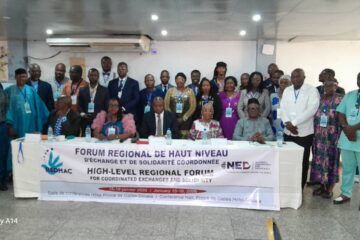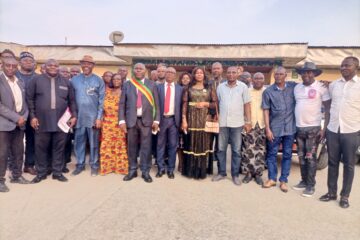DÉCLARATION DE LA COMMISSION DES DROITS DE L’HOMME DU CAMEROUN À L’OCCASION DE LA CÉLÉBRATION DE LA JOURNÉE INTERNATIONALE DÉDIÉE À LA MÉMOIRE DES VICTIMES DE L’HOLOCAUSTE

STATEMENT BY THE CAMEROON HUMAN RIGHTS COMMISSION TO MARK THE INTERNATIONAL DAY OF COMMEMORATION IN MEMORY OF THE VICTIMS OF THE HOLOCAUST
27 January 2024
The Commission recalls also that hate speech is defined by the United Nations: as any communication in speech, writing or behaviour that attacks or uses pejorative or discriminatory language with reference to someone’s religion, ethnicity, nationality, race, colour, descent, gender or other identity.
The Commission further recalls that Article 2 of the African Charter on Human and Peoples’ Rights adopted on 27 June 1981, ratified by Cameroon on 20 June 1989 and entered into force on 21 October 1989, forbids all forms of discrimination based on race, ethnic group, colour, sex, language, religion, political or any other opinion, national or social origin, fortune, birth or other status.
The Commission equally notes that Section 241-1 of Law No. 2019/020 of 24 December 2019 to amend and supplement some provisions of the Penal Code relating to contempt of tribe or ethnic group provides that whoever by any means makes hate speech against people or incites them to violence due to their tribal or ethnic origins shall be punished with imprisonment from one to two years and with fine of 300,000 (three hundred thousand) to 3,000,000 (three million) francs.
The Commission commends the publication by the National Communication Council (NCC) in its communiqué of 23 January 2024, where it reminds the entire national media community and the public that while preserving their freedom of expression, they remain bound by their role of education, information and social cohesion, in a spirit of objectivity, moderation and social responsibility, and calls on them to avoid potential divisive excesses.
The Commission strongly condemns all forms of ethnic, religious and political intolerance, attacks against minority communities, particularly during inter-community conflicts in some parts of the country, and the dissemination of ethnic supremacist messages in the media or during public or private meetings and demonstrations, disinformation, incitement to hatred on social media and the resurgence of violence in the home and society at large.
The Commission reiterates to the Government to practice zero tolerance for tribalism, including its most extreme form, ethnic supremacism, which, like the Holocaust, is based on the theory of a superior ethnic group.
*———————*
DÉCLARATION DE LA COMMISSION DES DROITS DE L’HOMME DU CAMEROUN À L’OCCASION DE LA CÉLÉBRATION DE LA JOURNÉE INTERNATIONALE DÉDIÉE À LA MÉMOIRE DES VICTIMES DE L’HOLOCAUSTE
27 janvier 2024
La Commission rappelle que les discours haineux ou discours de haine sont définis par les Nations Unies comme
tout type de communication orale ou écrite ou tout type de comportement visant à attaquer ou utilisant un langage péjoratif ou discriminatoire à l’encontre d’une personne, sur la base de sa religion, de son origine ethnique, de sa nationalité, de sa race, de sa couleur, de son ascendance, de son sexe ou de tout autre facteur d’identité.
La Commission rappelle en outre que l’article 2 de la Charte africaine des Droits de l’homme et des peuples, adoptée le 27 juin 1981, ratifiée par le Cameroun le 20 juin 1989 et entrée en vigueur le 21 octobre 1989 interdit toutes les formes de discrimination fondées sur la race, l’ethnie, la couleur, le sexe, la langue, la religion, l’opinion politique ou toute autre opinion, l’origine nationale et sociale, la fortune, la naissance ou toute autre situation.
La Commission note également qu’au sujet de l’outrage à la tribu ou à l’ethnie, l’article 241-1 de la loi n° 2019/020 du 24 décembre 2019 modifiant et complétant certaines dispositions du Code pénal dispose qu’est puni d’un emprisonnement d’un à deux ans et d’une amende de 300 000 à 3 000 000 francs, celui qui, par quelque moyen que ce soit, tient des discours de haine ou procède aux incitations à la violence contre des personnes en raison de leur appartenance tribale ou ethnique.
La Commission salue la publication, par le Conseil national de la Communication (CNC), du communiqué du 23 janvier 2024 dans lequel il rappelle à l’ensemble de la communauté médiatique nationale et à l’opinion publique, tout en préservant leur liberté d’expression, qu’ils demeurent astreints à leur rôle d’éducation, d’information et de reliance sociale, dans un esprit d’objectivité, de modération et de responsabilité sociale et interpelle ces derniers sur la nécessité d’éviter les dérives potentiellement polégomènes.
La Commission condamne, avec la dernière énergie, toutes les formes d’intolérance ethnique, religieuse, politique, les attaques contre des communautés minoritaires, surtout pendant les conflits intercommunautaires dans certaines localités du pays, la diffusion de messages de suprématisme ethnique dans les médias ou pendant des réunions et manifestations publiques ou privées, de désinformation, d’incitation à la haine sur les réseaux sociaux ainsi que la recrudescence des violences dans les ménages et, plus largement, dans la société.
La Commission réitère à l’attention du Gouvernement, de pratiquer la tolérance zéro contre le tribalisme, y compris sous sa forme la plus achevée qui est le suprématisme ethnique fondé, comme l’Holocauste, sur la théorie de l’ethnie supérieure.
#CHRC
#CDHC
#1523




















